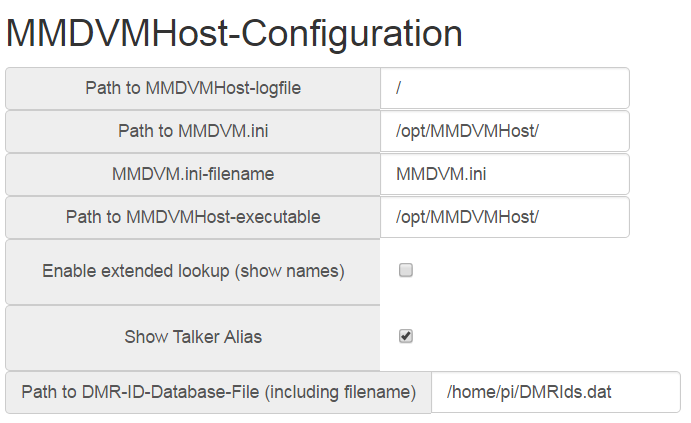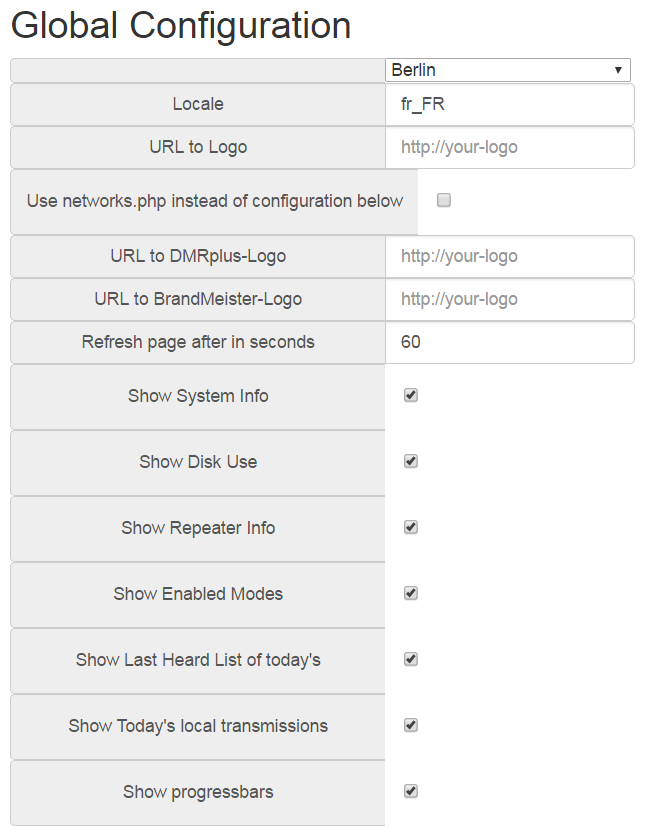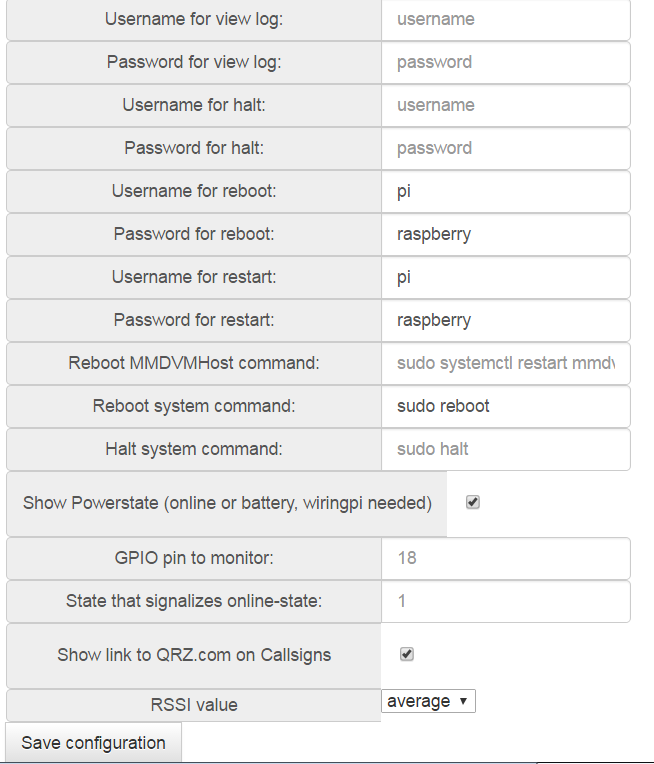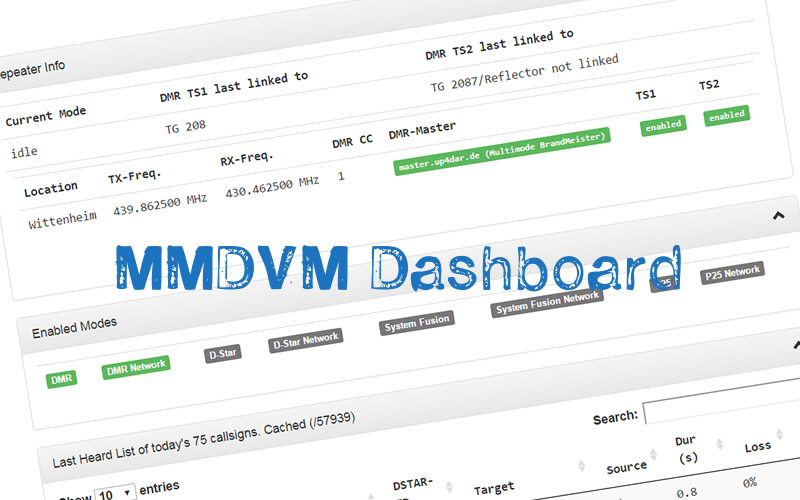This dashboard will inform you about the real-time operation of the MMDVM repeater.
This dashboard is proposed by Kim DG9VH. It exploits the MMDVM logs and must be installed on a web server. It is written in php.
Here are five steps to realize to have this functional dashboard on the raspberry pi MMDVM.
Preliminary step
Update the operating system with two commands
sudo apt-get update --fix-missing sudo apt-get upgrade --fix-missing
Install the git (community of codes opensource) downloading / synchronizing software
sudo apt-get install git
Validate the installation by Y for Yes
Installing the web server
Install the lightweight web server called lighttpd
sudo apt-get install lighttpd
Validate the installation by Y for Yes
Installing php
The php language must now be installed by these four command lines.
sudo apt-get install php5-common php5-cgi php5 sudo lighty-enable-mod fastcgi sudo lighty-enable-mod fastcgi-php sudo service lighttpd force-reload
Download
cd ~ git clone https://github.com/dg9vh/MMDVMHost-Dashboard.git
and move the files to the web server directory
sudo mv /home/pi/MMDVMHost-Dashboard/* /var/www/html/
Give access rights to the user www-data
sudo chown -R www-data:www-data /var/www/html sudo chmod -R 775 /var/www/html
Setting the MMDVM dashboard
Now we will configure the software so that it can retrieve the necessary elements from MMDVM.
From a web browser connect to the local network, launch a page pointing to the IP address of your Raspberry Pi MMDVM. To know his address, the following instruction on the Raspberry Pi will help you.
sudo ip addr show
For example :

You will be prompted to go to the setup on the setup.php page
MMDVM Part
Here is the operating part of MMDVM configurations

General configuration part

To have the Raspberry Pi restart or shutdown command buttons functional, you must enter the login and password.

Conclusion
The dashboard works correctly when you see the contact history in the “Last Heard List” section on the main page. Also when the relay is transmitting, a line is displayed in the “Currently TXing”

You can delete or simply rename the setup.php file to remove the warning message.
sudo mv /var/www/html/setup.php /var/www/html/setup.php.nomore
I take this opportunity to thank DG9VH for this very successful and working software.

simple et efficace. Merci F5UII
Translation
simple and efficient. Thanks F5UII
Merci Jean-Yves, toujours dans l’idée que cela puisse servir largement.
Thank you Jean-Yves, always with the idea that it can be used as widely as possible.
73 Christian
Many thanks 😃 It’s nice to see the own work doing a good job at many locations meanwhile.
73
Kim
DG9VH
(Traduction)
Merci beaucoup 😃 C’est agréable de voir son propre travail se concrétiser à de multiples endroits.
73
Kim
DG9VH
Thank you Kim for your contribution to the MMDVM project and help to follow up the working of digital repeaters.
Merci Kim pour votre contribution au projet MMDVM et aide au suivi des fonctionnements de relais numériques
Il faut que les commandes récursives qui donnent les droits à l’utilisateur www-data au répertoire /var/www/html soient exécutées après avoir recopié le contenu du dashboard récupéré à partir de gitHub.
Il faut faire:
sudo chown -R www-data:www-data /var/www/htmlsudo chmod -R 775 /var/www/html
Après la commande
sudo mv /home/pi/MMDVMHost-Dashboard/* /var/www/html/(Translation)
Recursive commands that give the user www-data rights to the /var/www/html directory must be executed after copying the dashboard content recovered from gitHub.
We have to do something:
sudo chown -R www-data: www-data /var/wwww/html
sudo chmod -R 775 /var/www/html
After ordering
sudo mv /home/pi/MMDVMHost-Dashboard/* /var/wwww/html/html
Tu as tout à fait raison, Ghislain, c’est mieux dans cet ordre ! La page est mise à jour
Merci !
(Translation)
You’re absolutely right, Ghislain, it’s better in that order! The page is updated
Thanks !
Pour que les commandes s’exécutent, il faut s’assurer que l’utilisateur
www-datasoit dans la liste des sudoers.(Translation)
In order for the commands to be executed, you must make sure that the user
www-datais in the sudoers list.Bonjour,
Même en ayant ajouté www-data au groupe sudo, aucune commande ne fonctionne, même après un reboot
Une idée ?
J'ai une hiérarchie différente, j'ai laissé le dashboard dans son rep d'origine, soit :
/var/www/html/MMDVMHost-Dashboard/Ce qui me permet de pouvoir continuer à utiliser le "git pull" pour les mises à jour.
(Translation)
Hello,
Even after adding www-data to the sudo group, no commands work, even after a reboot
Any ideas?
I have a different hierarchy, I left the dashboard in its original directory :
/var/www/html/MMDVMHost-Dashboard/This allows me to continue to use the "git pull" for updates.
Pierre-Philippe,
Comme l'indique Ghislain, il faut ajouter le user www-data au fichier des sudoers. Mais pour des raisons de sécurité, je préconise de limiter les droits aux commandes que l'on veut autoriser
sudo nano /etc/sudoerset ajouter la ligne
www-data ALL=NOPASSWD: /home/pi/commande_executable, /home/pi/autre_commande et_option, /home/pi/troisieme_commandeoù vous listerez les chemins vers les scripts exécutables depuis le tableau de bord (https://github.com/dg9vh/MMDVMHost-Dashboard/tree/master/scripts).
Ghislain peut éventuellement préciser ce qu'il aurait mis en place sur F1ZGG…
J'espère avoir pu aider.
(Translation)
Pierre-Philippe,
As Ghislain points out, the user www-data must be added to the sudoers file. But for safety reasons, I recommend limiting the rights to the orders you want to authorize
sudo nano /etc/sudoersand add the line
www-data ALL=NOPASSWD: /home/pi/command_executable, /home/pi/other_command and_option, /home/pi/third_commandwhere you will list the paths to the executable scripts from the dashboard (https://github.com/dg9vh/MMDVMHost-Dashboard/tree/master/scripts).
Ghislain can possibly specify what he has implemented on F1ZGG….
I hope I could have helped.
Trying to install php5 into my raspbian I get this error:
sudo apt-get install php5-common php5-cgi php5Package php5 is not available, but is referred to by another package.This may mean that the package is missing, has been obsoleted, or
is only available from another source
E: Package 'php5-common' has no installation candidate
E: Package 'php5-cgi' has no installation candidate
E: Package 'php5' has no installation candidate
PRETTY_NAME="Raspbian GNU/Linux 9 (stretch)"NAME="Raspbian GNU/Linux"
VERSION_ID="9"
VERSION="9 (stretch)"
ID=raspbian
ID_LIKE=debian
HOME_URL="http://www.raspbian.org/"
SUPPORT_URL="http://www.raspbian.org/RaspbianForums"
BUG_REPORT_URL="http://www.raspbian.org/RaspbianBugs"
What will be the right packages for this?
(Traduction)
En essayant d’installer php5 dans mon raspbian j’obtiens cette erreur:
sudo apt-get install php5-common php5-cgi php5-commonPackage php5 is not available, but is referred to by another package.This may mean that the package is missing, has been obsoleted, or
is only available from another source
E: Package 'php5-common' has no installation candidate
E: Package 'php5-cgi' has no installation candidate
E: Package 'php5' has no installation candidate
PRETTY_NAME="Raspbian GNU/Linux 9 (stretch)"NAME="Raspbian GNU/Linux"
VERSION_ID="9"
VERSION="9 (stretch)"
ID=raspbian
ID_LIKE=debian
HOME_URL="http://www.raspbian.org/"
SUPPORT_URL="http://www.raspbian.org/RaspbianForums"
BUG_REPORT_URL="http://www.raspbian.org/RaspbianBugs"
Quels sont les bons paquets pour cela?
Franck,
With the raspbian stretch version (v9) comes with PHP7 as the standard, so there are no PHP5 packages.
So you can try to install the MMDVM dashboard with PHP7:
sudo apt-get install php7.0 php7.0-mcrypt php7-common php7-cgiIf you php5 is required, you can follow the instructions to install this version on this page : https://stackoverflow.com/questions/36788873/package-php5-have-no-installation-candidate-ubuntu-16-04#answer-36789471
(Traduction)
Franck,
Avec la version raspbian stretch (v9) est livré avec PHP7 en standard, donc il n’ y a pas de paquets PHP5.
Vous pouvez donc essayer d’installer le dashboard MMDVM avec PHP7:
sudo apt-get install php7.0 php7.0-mcrypt php7-common php7-cgicodeSi vous avez besoin de php5, vous pouvez suivre les instructions d’installation de cette version sur cette page: https://stackoverflow.com/questions/36788873/package-php5-have-no-installation-candidate-ubuntu-16-04#answer-36789471 “.
sudo apt-get install php7.0 php7.0-mcrypt php7-common php7-cgisudo apt-get install php7.0
Now all is done.
I have my rasp with OLED and dashboard working using your great step-by-step. I build a ZUM board in a veroboard (don’t looks so bad)
But by the way what will be the DMR server and some others details like TG or my ID that I must setup to start to test ,I mean what I need to set into MMDVMHost.ini to see some activity ?
My RF is a couple of TM8110, the TX looks great but did you set some att for the receiver output ? (I’m using a voltage divider 10K+1K).
I don’t see any activity when I transmit with a DMR handheld. What I’m doing wrong?
Best Regards!
(Traduction)
sudo apt-get install php7.0 php7.0 php7.0-mcrypt php7-common php7-cgisudo apt-get install php7.0 de sudo apt-get
Maintenant tout est bon.
J’ai mon raspi avec OLED et le tableau de bord qui fonctionne en utilisant votre super tutoriel pas à pas. Je construis une platine ZUM sur un veroboard (donne pas si mal)
Mais il me reste à définir le serveur DMR et quelques autres détails comme TG, mon ID que je dois configurer pour commencer à tester; que dois-je mettre dans MMDVMHost.ini pour voir de l’activité ?
Pour la partie HF, j’utilise un couple de TM8110, l’émission est ok, mais avez-vous une atténuation pour attaquer du récepteur? (J’utilise un diviseur de tension 10K+1K).
Je ne vois aucune activité lorsque je transmets avec un terminal DMR. Qu’est-ce que je fais de mauvais ?
Meilleures salutations!
I found it necessary to edit the lighttpd config to Stop pointing to the ‘dashboard’ directory
*Maybe this is something new in the version of the image I used?
sudo nano /etc/lighttpd/lighttpd.conf
and change
server.document-root = “/var/www/dashboard”
to be
server.document-root = “/var/www/html”
(Traduction)
J’ai trouvé nécessaire d’éditer la configuration de lighttpd pour arrêter de pointer vers le répertoire’dashboard’.
Peut-être que c’est quelque chose de nouveau dans la version de l’image que j’ai utilisée ?
sudo nano /etc/lighttpd/lighttpd/lighttpd.conf
et le changement
server.document-root = “/var/www/dashboard”.
d’être
server.document-root = “/var/www/html”.
After spending time, I am not sure if this is up-to-date. and the 3 hours spent reviewing … this is worth doing …. no page update…. owner please revisit this
(Traduction)
Après avoir passé du temps, je ne suis pas sûr que ce soit à jour. et les 3 heures consacrées à l’examen …. cela vaut la peine d’être fait. pas de mise à jour de la page. propriétaire s’il vous plaît revisiter ceci
Mike,
You’re probably right, applications are always evolving. Do not hesitate to publish your discoveries in order to help the readers of the evolutions to apply to the tutorial.
(Traduction)
Mike,
Vous avez surement raison, les applications évolues toujours. N’hésitez pas à publier vos découvertes afin d’aider les lecteurs sur les évolutions à appliquer au tutoriel.
Mny TNX for your guide.
Only a question….in my dashboard have this info
“File custom.php not found! Did you forget to create it?”
but i don’t know the custom.php file !!
What is it for? What should I enter in the file
Tnx again
(Traduction)
Merci beaucoup pour votre guide.
Seule une question……dans mon tableau de bord apparait ce message
“Fichier custom.php introuvable ! Avez-vous oublié de le créer ?”
mais je ne connais pas le fichier custom.php.
A quoi cela sert-il ? Que dois-je créer dans le dossier ?
Merci à nouveau
Adam,
You have ticked “Show Custom Info” on the setup page. You have just to uncheck it.
73
Chris
(Traduction)
Adam,
Vous avez coché “Afficher les informations personnalisées” sur la page de configuration. Il faut juste la décocher.
73
Chris
Hi.
I don’t find file
DMRIds.datand fileCALLSIGN_NAME.txt.I can not find in my raspberry the
DMRIds.datfile and theCALLSIGN_NAME.txtfile.Where should they be? Do I have to create them or import them the first time?
Thank you
Hello
Adam
(Traduction)
Salut.
Je ne trouve pas le fichier
DMRIds.datet le fichierCALLSIGNNAME_NAME.txt.Je ne trouve pas dans ma framboise le fichier
DMRIds.datet le fichierCALLSIGNNAME_NAME.txt.Où devraient-ils être ? Dois-je les créer ou les importer la première fois ?
Je vous remercie
Adam
This
DMRIds.datfile is updated by the DMRIDUpdate.sh script provided by MMDVMHost (https://github.com/g4klx/MMDVMHost/blob/master/linux/DMRIDUpdate.sh). The script distributed by DG9VH is obsolete today. Indeed, the new European data protection law (PDRG) has entered into effect. The file is no longer available is now hosted here https://ham-digital.org/status/ and no longer downloadable from http://www.dmr-marc.net/This script must be configured (DMRIDPATH path) then be running daily by a crontab (https://github.com/dg9vh/MMDVMHost-Dashboard/blob/master/cron/updateDMRIDs) to receive the latest updates automatically.
73 Chris
(Traduction)
Ce fichier est mis à jour par le script DMRIDUpdate.sh fournis par MMDVMHost (https://github.com/g4klx/MMDVMHost/blob/master/linux/DMRIDUpdate.sh). Le script distribué par DG9VH est obsolète à ce jour. En effet le nouveau règlement européen de protection des données est entré en vigueur. Le fichier n’est plus disponible est à présent hébergé ici https://ham-digital.org/status/ et n’est plus téléchargeable depuis http://www.dmr-marc.net/
Ce script doit être configuré (chemin DMRIDPATH) puis lancé quotidiennement par un crontab (https://github.com/dg9vh/MMDVMHost-Dashboard/blob/master/cron/updateDMRIDs) pour recevoir les dernières mises à jour automatiquement.
73 Christian
I realized that when I call the IP of the system and then the dashboard responds to me, the temperature of the raspberry rises dramatically.
In a moment it rises from the normal 56/59 degrees, up to almost 80 degrees.
If I go out of the dashboard, the temperature in a very short time returns to normal values.
Does anyone know how we can try to solve this problem?
Thank you
(Traduction) J’ai réalisé que lorsque j’appelle l’IP du système et que le tableau de bord me répond, la température de la framboise monte en flèche.
En un instant, il passe de 56/59 degrés à presque 80 degrés.
Si je sors du tableau de bord, la température en très peu de temps revient aux valeurs normales.
Quelqu’un sait-il comment nous pouvons essayer de résoudre ce problème ?
Je vous remercie